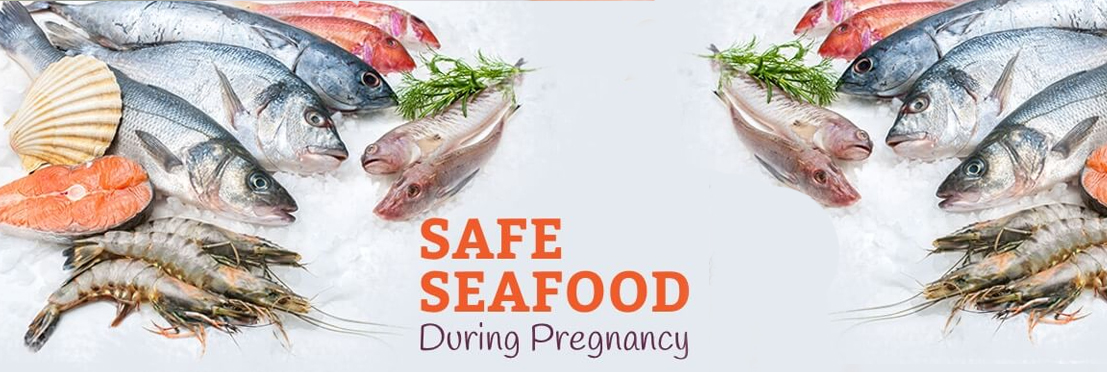5/5 - (4 votes)
What fish we can eat during pregnancy? A complete guide

Fish can be an excellent addition to a pregnant woman’s diet, offering numerous benefits for both the mother and the developing baby. However, it’s important to be aware that not all types of seafood are safe to consume during pregnancy. Here’s a guide on the advantages of eating fish while pregnant, along with information on which varieties are safe and which should be avoided.If you’re confused about the guidelines regarding fish consumption during pregnancy, you’re not alone; there has been a lot of mixed information over time. Fish is known for being good for heart health, but it also contains mercury. While fish is rich in DHA (docosahexaenoic acid), is an omega-3 fatty acid, which is beneficial for babies, it can also have harmful PCBs.
So, what’s the scoop on eating fish during pregnancy? Here’s the essential information on which seafood is safe and which to avoid. We truly believe in prioritizing safety and maintaining healthy eating habits.
Is it safe to eat fish while pregnant?
Consuming the right kinds of seafood is not just beneficial but also encouraged for both you and your baby.
According to the Environmental Protection Agency (EPA) and the Food and Drug Administration (FDA), pregnant and breastfeeding women should aim for 8 to 12 ounces of low-mercury fish each week, which equates to about two to three servings.
What kinds of fish are safe to eat during pregnancy?
While there are several fish to limit during pregnancy, the majority of fish you can find at grocery stores and restaurants are safe to consume when you’re expecting. It’s recommended to have two to three servings (8 to 12 ounces) each week. These include:
Some people get confused with conflicting opinions on salmon during pregnancy. It’s important to note that salmon is one of nature’s top sources of DHA. To avoid the higher levels of PCBs often found in farmed salmon, it’s best to choose wild salmon, which also contains more of those healthy omega-3 fats, or opt for organic farmed salmon.
Benefits of fish during pregnancy
Seafood lovers need not worry; the good news is that fish offers great benefits for both moms and their developing babies. Fish is rich in omega-3 fatty acids, especially DHA, which is vital for the baby’s brain and nervous system development. Including fish in your diet can provide you with various benefits. Below are the benefits of eating fish during pregnancy:
Good for baby brain: Fattier fish, especially salmon, are rich in the omega-3 fatty acid DHA, which has been proven to enhance brain development in babies. This nutrient becomes increasingly crucial during the third trimester when your baby’s brain is growing rapidly.
Support fetal growth: Fish is recognized as a top source of lean protein, providing essential amino acids that contribute to the development of all your baby’s cells, including those in the skin, muscles, hair, and bones.
Enhances your mood: Sufficient consumption of omega-3 fatty acids, particularly DHA, may lower your chances of experiencing depression during pregnancy and reduce the risk of postpartum depression.
Boosts your memory: Talking about improved brain power, getting enough omega-3s might also help boost your memory—especially useful when you’re dealing with pregnancy brain.
Good for heart health: Eating a diet high in fish can decrease your chances of heart disease by minimizing blood clotting and lowering triglyceride levels (the fat in your blood), along with reducing blood pressure if you already have high blood pressure.
Might reduce preterm birth risk: Researchers have noted that regions with high fish consumption tend to have lower rates of preterm birth. Additionally, some studies have connected sufficient omega-3 intake, whether from fish or supplements, to a reduced risk of preterm birth.
Guidelines for safely eating fish during pregnancy:
There are several steps you can take into consideration in order to avoid risks while eating fish during pregnancy.
Cook properly: Ensure that all fish is cooked to an internal temperature of 145°F (63°C) to kill harmful bacteria and parasites. Avoid raw or undercooked fish, such as sushi or sashimi.
Avoid large, predatory fish: To reduce your mercury exposure, avoid consuming shark, swordfish, king mackerel, and tilefish.
Avoid raw fish and shellfish: To prevent exposure to harmful bacteria or viruses, steer clear of raw or undercooked fish and shellfish. This includes oysters, sushi, sashimi, and any refrigerated seafood labeled as nova style, lox, kippered, smoked, or jerky that hasn’t been cooked.
Understand local fish advisories: If you’re consuming fish from nearby waters, make sure to follow local advisories. If there are no guidelines available, try to restrict your intake of local fish to 6 ounces (170 grams) per week.
Fish to avoid during pregnancy
While fish offers numerous benefits, there are certain types you should avoid during pregnancy. Some fish, especially large predatory species that roam the ocean, have high mercury levels, which can be harmful to a developing baby. Additionally, fish from polluted lakes and rivers may contain polychlorinated biphenyls (PCBs), which are chemicals that you definitely want to keep away from both fetuses and infants.
It’s advisable to avoid these seven fish species, as they contain higher levels of mercury:
Here are the seven types of fish you should avoid due to their high mercury content:
– Shark
– Orange roughy
– King mackerel
– Tilefish from the Gulf of Mexico
– Bigeye tuna
– Marlin

